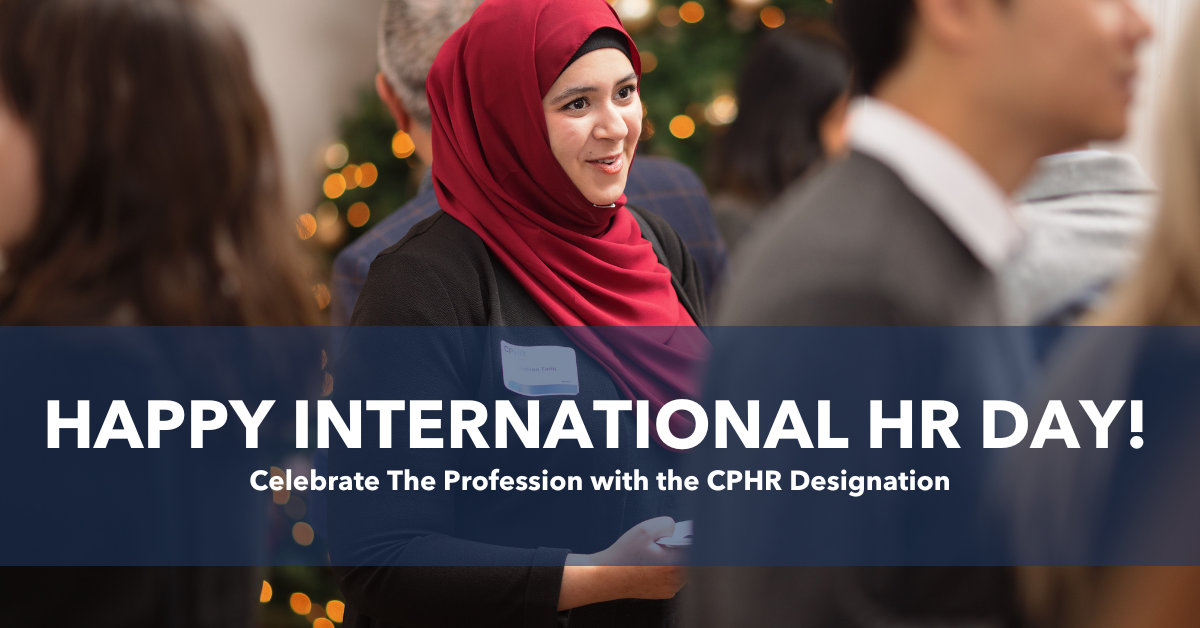
Celebrating International Human Resources Day
The Power of HR and the Value of Being a CPHR
Every year on May 20, we celebrate International Human Resources Day, a time to recognize the tireless efforts of HR professionals around the globe who shape workplaces, support employees, and drive organizational success. This year, let’s reflect on the growing importance of HR worldwide—and the value of professional designations like CPHR (Chartered Professional in Human Resources) that elevate our field.
The Global Significance of HR
From Calgary to Cape Town and from Toronto to Tokyo, Human Resources is the backbone of every organization. HR professionals don't just manage hiring and benefits, they champion culture, guide leaders, and ensure that businesses remain ethical, inclusive, and adaptable in a fast-changing world. In today’s global landscape, HR is more than a support function. It’s strategic. It's data-driven. It’s about building people-first workplaces where innovation and well-being can thrive.
Across borders and cultures, HR helps organizations:
- Attract and retain top talent
- Build resilient and diverse teams
- Drive employee engagement and productivity
- Ensure fair and transparent workplace practices
- Support mental health and well-being
- Navigate remote and hybrid work models
- Foster leadership and succession planning
Why Become a CPHR?
In Canada, the CPHR designation stands as a mark of excellence, credibility, and commitment in the HR profession. Whether you're just starting out or advancing your career, becoming a CPHR can open doors and demonstrate that you meet the highest professional standards in HR.
CPHR Alberta has membership types to meet the needs of HR and business professionals at all career levels. Members of CPHR Alberta belong to a vibrant community of over 6,900 HR practitioners and business leaders, including over 3,300 CPHRs living and working in Alberta, the Northwest Territories, and Nunavut. CPHR Alberta provides valuable resources for professionals at all career stages:
- Professional Development and Networking: Access events that fit your schedule and help advance your career.
- Exclusive Offers: Benefit from industry partnerships, including Professional Liability Insurance with EasyCover by Rogers Insurance Ltd., home and auto insurance with TD Meloche Monnex, and exclusive savings with Perkopolis.
- HR Resources: Utilize the HR Toolkit and get first access to print publications and email newsletters.
- Regional HR Research: Stay informed with HR research specific to our region.
- Career Center: Explore the largest human resources job board in Alberta, the Northwest Territories, and Nunavut, with resume uploading and special member rates.
From Student Member to General Member, Associate, Candidate, Chartered, and Retired Members, there is a fit for HR professionals and business practitioners at every stage of their career.
Learn more about Memberships.
Final Thoughts
As we celebrate International Human Resources Day, let's honor the role of HR in creating workplaces that work for everyone. Whether you’re an experienced HR leader or an aspiring student, being part of this community is something to be proud of.
And if you're looking to level up your career, consider pursuing your CPHR designation—because HR professionals deserve recognition, growth, and the tools to lead in a globalized, people-focused world.
Happy International Human Resources Day!
Let’s keep building a better world of work—together.
About the Author:
Zahra Aghababaei is a Research Assistant at Bow Valley College and an experienced HR professional with over six years in talent acquisition, employee relations, and organizational development. She is currently pursuing a diploma in Health and Human Services Management, exploring the intersection of HR and community development. Zahra holds a master's in communication and a bachelor's in mathematics, and actively volunteers with the Calgary Business and Professional Women's Association and the CPHR Alberta Social Media Committee. In her free time, she enjoys biking, social gatherings, and attending concerts and theater performances.
The views and opinions expressed in this blog post belong solely to the original author(s) and do not necessarily represent the views and opinions of CPHR Alberta.





